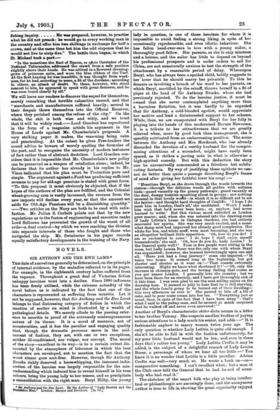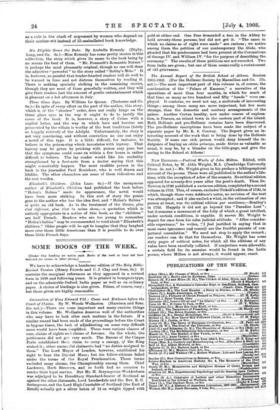NOVELS.
SIR, ANTHONY AND THE EWE LAMB.*
Thu date of anovel can generally be determined, on the principle of internal evidence, by the maladies referred to in its pages. For example, in the eighteenth century ladies suffered from the vapours. Throughout a great deal of Victorian fiction unhappy heroines went into a decline. Since 1890 influenza has been- freely utilised, while the extreme actuality of the novel before us is indicated by the fact that one of the characters is represented as suffering from neuritis. Let it not be supposed, however, that Sir Anthony and the Ewe Lamb belongs to that distressing category of fiction in which the reaction of matter on mind is illustrated by a wealth of pathological details. We merely allude to the passing refer- ence to neuritis in proof of the extremely contemporaneous nature of its theme. It is a novel of manners, not of monstrosities, and it has the peculiar and engaging quality that, though the dramatis personae move in the mid- current of fashion, they are, with one or two exceptions, neither ill-conditiened, nor vulgar, nor corrupt. The moral of the story—excellent in its way—is to a certain extent dis- counted by the atmosphere of tolerance in which the best characters are enveloped, not to mention the fact that the worst sinner goes scot-free. However, though Sir Anthony Brooks richly deserved a horsewhipping, the innocent indis- cretion of the heroine was largely responsible for the mis- understanding which induced him to reveal himself in his true colours, bring the young lady to her senses, and so precipitate a reconciliation with the right man. Beryl Hilby, the young • Ear Anthony and the Moo Lamb. By the Author of "Lady Beatrix and the Porbidden Man." London: Harper and Brothers. [3s. GI] lady in question, is one of those heroines for whom it is impossible to avoid feeling a strong liking in spite of her occasionally reprehensible, and even idiotic, behaviour. She has fallen head-over-ears in love with a young sailor, a. thoroughly good fellow. Her parents, as she is only nineteen-
and a heiress, and the Bailor has little to depend on beyond his professional prospects and is under orders to sail for
China, are not unnaturally anxious to test the strength of the attachment by a reasonable period of delay. Whereupon Beryl, who has always been a spoiled child, boldly suggests to her lover that he should marry her privately. To this he
demurs as involving a breach of his word to her parents, on which Beryl, mortified by the rebuff, throws herself in a fit of pique at the head of Sir Anthony Brooks, whom she had previously rejected. To do the heroine justice, it must be owned that she never contemplated anything more than a harmless flirtation, but it was hardly to be expected
that Sir Anthony, a cold-blooded egotist, would appreciate her motive and lend a disinterested support to her scheme. While, then, we are exasperated with Beryl for her folly in playing into the hands of this modernised Barnes Newcome, it is a tribute to her attractiveness that we are greatly relieved when, more by good luck than management, she is
speedily extricated from an embarrassing position. The scene between Sir Anthony and Mrs. Mordaunt, who has already discarded the devotion of a worthy husband for the compro- mising attentions of a scoundrel, might have easily been spared, as it strikes a jarring note in what is otherwise a high-spirited comedy. But with this deduction the story can be unreservedly commended as a frivolous but exhila- rating fantasia. By way of justifying these epithets we can-
not do better than quote a passage describing Beryl's frame of mini after giving her faithful lover his congg :— "Meantime Beryl, as she drove through the woods towards the station—through the delicious woods all golden with autumn tints—gazed vacantly up the grassy pathways ; gazed vacantly at the dear, dumpy bunnies squatting about in groups ; saw nothing unusual in that lovely world—in which it is so difficult not to see the fairies—and thought hard thoughts of Cunliffe. 'I hope I do meet him in London, that's all,' she meditated. Won't I make him wish that he'd never been born ; or, anyhow, had never learned to write.' But this vicious mood subsided as London grew nearer; and, when she was ushered into the drawing-room of Lady Letitia's house in Cadogan Gardens, she had entirely recovered her spirits. She was very much excited, and a some- what damp mist had improved her already good complexion. Her white fur boa, and white muff, were most becoming, and she was an altogether brilliant little apparition. Oh, how do you do? I am so enchanted to come ! I do hope I shall enjoy myself tremendously,' she said. Oh, how do you do, Lady Louisa ? Is the General quite well?' Four or five people were sitting in the room, but Lady Louisa Borer was the only one with whom Beryl was acquainted; however, she beamed bewitchingly upon one and all. 'Have you had a long journey ? ' some one inquired.—' It takes two hours. It seemed long at the beginning, but got shorter and shorter as it went on.'—' That sounds extremely interesting. Might we know what shortened it? Oh, only the increase in chimney-pots, and the towney feeling that comes as you get nearer London. I generally love the country ; but we have been there for an eternity, and I have got thoroughly sick of it this time. I was even glad to see the man selling palms on the doorstep here. It seemed so jolly to hear that he is still starving, and the whole family going to be turned out of their dwelling— this very afternoon as ever is.' She paused to bite off a bit of cake, and to pour some cream into her tea. "Everything just as usual, then, in spite of the fact that I have been away " : that's what I said to the palmy-man, and he seemed so much surprised. that he walked off and never even answered!"
Another of Beryl's characteristic obiter dicta occurs in a letter to her brother Tommy. She suspects another brother of paying serious attentions to a lady much his senior, and adds :—" It is fashionable anyhow to marry women twice your age. The only question is whether Lady Letitia is quite old enough. I sha'n.'t be able to fall in with the fashion unfortunately, for my poor little husband would not be ten; and even in these days that's rather too young." Lady Letitia Crofts, it may be added, is the subject of a delightful remark of Lady Louisa Borer, a personage of whom we hear all too little :—" You know it is no wonder that Letitia is a little peculiar. Adrian Crofts was well—very much so. He wrote a book on—on- comparative something. I can't recollect what ; but a man at the Club once told the General that he had ha-aid of some-
body who had read it."
The sketches of the smart folk who play at being intellec-
tual or philanthropic are amusingly done, and the anonymous author is true to life in showing the great superiority enjoyed as a rule in the 'clash of argument by women who depend 'on their mother-wit instead of ill-assimilated book knowledge.











































 Previous page
Previous page